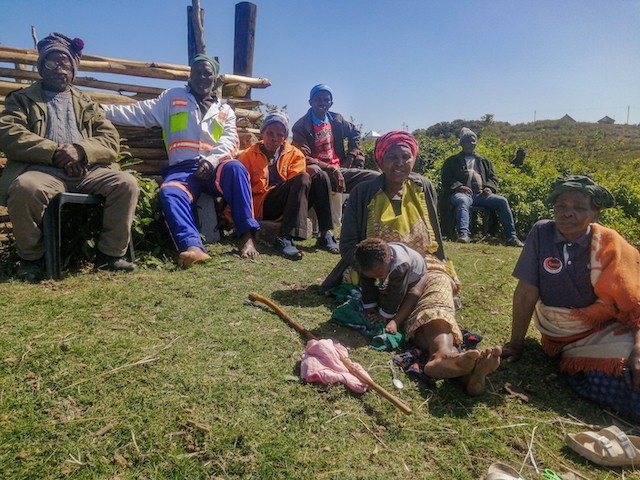Black Sash film challenges SASSA’s closure of cash pay points in rural areas
But SASSA says it is inefficient and unsustainable to transport cash to a “handful of people”.
Pensioners from Xhora Mouth wanted their local cash pay points for social grants to remain operational. A similar call from grant beneficiaries in rural areas was highlighted in a documentary screened by the Black Sash this week. Archive photo: Mkhuseli Sizani
- A short documentary film by the Black Sash shows how the closure of cash pay points has made it difficult for recipients of social grants, especially in rural areas, to access their money.
- In the documentary a SASSA executive suggests that the Department of Transport be brought on board to subsidise transport for grant recipients to pay points on payment days.
- A SASSA spokesperson told GroundUp that it is not “efficient nor sustainable” to transport cash to a “handful of people”.
The difficulties faced by recipients of the Old Age Grant who live in rural areas far from economic hubs were highlighted in a new documentary titled Broken Promises screened by the Black Sash this week.
Cash pay points have decreased from 9,671 in 2019 to 894 in 2023. The SA Social Security Agency (SASSA) told Parliament in February that only 142,000 people still make use of cash pay points - about 0.8% of all SASSA grant recipients - and 123,000 people collect their money from Post Office branches. The vast majority of grant recipients are paid their grant money directly into their bank accounts or SASSA/Postbank cards.
In September 2022, GroundUp reported that pensioners in Xhora Mouth in the Eastern Cape were struggling after the local SASSA cash pay point was shut down at short notice.
The Black Sash documentary showed how grant recipients incur high transport costs to travel to their closest ATM, retail shops, post offices or pay points. They need to brave harsh weather conditions and risk getting mugged.
At the pay points that still remain, Black Sash found, payments and cash availability are irregular and there is insufficient customer service.
“The government should know we are humans, not animals. When you are old, you need help,” says pensioner Elsie Maruben from Hlamvana village in the Eastern Cape, in the documentary.
The South African Post Office does not have the capacity to run cash pay points due to the costs involved in transporting cash to communities, and SASSA is prioritising paying money into recipients’ SASSA/Postbank cards or private bank accounts.
According to Black Sash, the documentary reveals “a direct infringement of beneficiaries’ rights and a blatant dismissal of SASSA Norms and Standards”.
Evashnee Naidu, Black Sash’s regional manager for KwaZulu-Natal, says: “SASSA’s tagline is paying the right grant to the right person at the right time. Why are you not asking the community what is in their best interest?”
The documentary includes an interview with SASSA Executive Officer, Brenton van Vrede, explaining that transporting cash to many recipients is not feasible.
Van Vrede suggested that a better option would be to get the Department of Transport to provide transport services for pensioners to access ATMs and shops to access their grants.
Asked for comment following the release of the documentary, SASSA spokesperson Paseka Letsatsi said: “It’s important to note that the documentary was edited and only portions of what Mr. Van Vrede said was used. However, the point does still come across.”
Letsatsi said that it is “neither efficient nor sustainable” to transport cash to a “handful of people”.
“The key point is that the R1-billion spent on paying for ‘payments services’ could be more efficiently utilised in a developmental manner to empower these rural communities.
“One option could be providing a subsidised transport service for the community to reach economic hubs. Others could be supported by local small businesses and informal traders to be able to transact cashless. This, however, is not the mandate of SASSA.”
Letsatsi said that payment services and infrastructure are not obligatory, according to the SASSA Act. “It’s a service that SASSA may provide, not must,” Letsatsi told GroundUp.
“A documentary such as this one only engages communities on the aspect of what the activists want and seeks to find the communities to buy into it. SASSA’s engagements with communities are more balanced, and we generally find that communities are more accepting of paypoint closures when they fully understand the costs,” he says.
Black Sash director Rachel Bukasa said that the documentary screening was attended by Van Vrede and he had not raised any issues about the documentary after the event. “It’s natural for government to respond in this manner. Black Sash stands behind the documentary,” said Bukasa.
Support independent journalism
Donate using Payfast

Don't miss out on the latest news
We respect your privacy, and promise we won't spam you.
Next: NSFAS budget cuts could leave more than 87,000 students without funding in 2024
Previous: The Big Issue might have to shut down after R600,000 cyber scam
© 2023 GroundUp. This article is licensed under a Creative Commons Attribution-NoDerivatives 4.0 International License.
You may republish this article, so long as you credit the authors and GroundUp, and do not change the text. Please include a link back to the original article.
We put an invisible pixel in the article so that we can count traffic to republishers. All analytics tools are solely on our servers. We do not give our logs to any third party. Logs are deleted after two weeks. We do not use any IP address identifying information except to count regional traffic. We are solely interested in counting hits, not tracking users. If you republish, please do not delete the invisible pixel.

